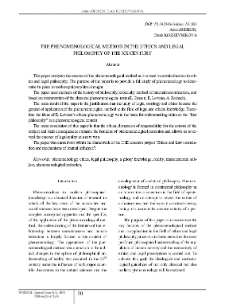Օբյեկտ
Վերնագիր: The Phenomenological Method in the Ethics and Legal Philosophy of the XX Century
Journal or Publication Title:
Date of publication:
Volume:
Number:
ISSN:
Corporate Creators:
Խ․ Աբովյանի անվան հայկական պետական մանկավարժական համալսարան
Coverage:
Abstract:
This paper analyzes the essence of the phenomenological method as it is used in certain theories in ethics and legal philosophy. The purpose of the paper is to provide a full study of phenomenology to determine its place in modern philosophical thought. The paper used methods of the history of philosophy, especially method of rational reconstruction, and based on interpretation of the classical phenomenological texts (E. Husserl, E. Levinas, A. Reinach). The main result of the paper is the justification that the unity of logic, ontology and ethics became the ground of application of the phenomenological method in the field of legal and ethical knowledge. Therefore the ideas of E. Levinas‟s ethical phenomenology were the basis for understanding ethics as the “first philosophy” in a phenomenological context. The main conclusion of this paper is that the ethical dimension of responsibility for the actions of the subject and their consequences expands the horizons of phenomenological reduction and allows us to reveal the essence of legal reality in a new way. The paper was carried out within the framework of the HSE research project “Ethics and Law: correlation and mechanisms of mutual influence”.
Place of publishing:
Երևան
Publisher:
Format:
Identifier:
oai:arar.sci.am:370993
Language:
Օբյեկտի հավաքածուներ:
Վերջին անգամ ձևափոխված:
Oct 8, 2025
Մեր գրադարանում է սկսած:
Mar 12, 2024
Օբյեկտի բովանդակության հարվածների քանակ:
69
Օբյեկտի բոլոր հասանելի տարբերակները:
https://arar.sci.am/publication/400880
Ցույց տուր նկարագրությունը RDF ձևաչափով:
Ցույց տուր նկարագրությունը OAI-PMH ձևաչափով։
-
Իմաստություն=Wisdom=Мудрость
-
Իմաստություն, 2013, N 1
-
Իմաստություն, 2014, N 1 (2)
-
Իմաստություն, 2014, N 2 (3)
-
Իմաստություն, 2015, N 1 (4)
-
Wisdom, 2015, N 2 (5)
-
Wisdom, 2016, N 1 (6)
-
Wisdom, 2016, N 2 (7)
-
Wisdom, 2017, N 1 (8)
-
Wisdom, 2017, N 2 (9)
-
Wisdom, 2018, N 1 (10)
-
Wisdom, 2018, N 2 (11)
-
Wisdom, 2019, N 1 (12)
-
Wisdom, 2019, N 2 (13)
-
Wisdom, 2020, N 1 (14)
-
Wisdom, 2020, N 2 (15)
-
Wisdom, 2020, N 3 (16)
-
Wisdom, 2021, N 1 (17)
-
Wisdom, 2021, N 1 (1) Special issue
- Editorial board
- Contents
- Editor`s Foreword
- Epistemological Aspects of the Organisation of Human Activity in the Transition from Disparate Social Techniques to Societal Technologies
- The Idea of Human Rights: From the Ancient World to the Digital Age
- The Principle of Deliberation as a Key Basis of Statehood in Modern Russia
- The Aesthetic Doctrine of Law (Aesthetics of Law) in the Context of the Development of NBICS Technologies
- The Phenomenological Method in the Ethics and Legal Philosophy of the XX Century
- Genesis and Historical Sense of the Motto “Liberté, Égalité, Fraternité”
- Some Methodological Problems of Preventing Crimes Against Political Rights in Modern Democratic States (Philosophy-Legal Dimension)
- The Legal Status of an Individual in Russian Scientific, Political and Legal Doctrines
- The Influence of the Ruling Elite on Political Activity in the Conditions of Destructuring the Essence of the Philosophy of Law
- The Conventional Nature of Legal Values
- Axiological Aspect of Legal Consequential Thought of the Late 18th – Early 20th Centuries
- Mythologisation of Law by Historical Consciousness
- Dialectics of Philosophical Pillars of the Law and Development Doctrine
- Value and Regulatory Foundations for Digital Transformation of Modern Social Relations: Theological and Conservative Legal Aspects
- Development of English Legal Positivism from Bentham to Salmond and Brown: Leading Ideas in the Context of the Common Law Tradition
- Private and Public Interests in Russian Law and Jurisprudence: Transformation of Approaches
- Legal Theology in Interdisciplinary Discourse
- V. S. Nersesyants’ Political and Legal Ideas about the Rule of Law State and Their Reflection in the Constitution of the Russian Federation and the Constitution of the Republic of Armenia
- Philosophical Foundations for Understanding the System of Law
- Law and Logic: E. Bulygin’s Deductive Pattern of Judicial Reasoning
- Philosophical and Legal Foundations of the Comprehensive Theory of Law
- The Sociocultural Context in Law: Modernism - Postmodernism - Metamodernism
- Authors
-
Wisdom, 2021, N 2 (18)
-
Wisdom, 2021, N 3 (19)
-
Wisdom, 2021, N 4 (20)
-
Wisdom, 2022, N 1 (21)
-
Wisdom, 2022, N 1 (2) Special issue
-
Wisdom, 2022, N 2 (22)
-
Wisdom, 2022, N 2 (3) Special issue
-
Wisdom, 2022, N 3 (23)
-
Wisdom, 2022, N 3 (4) Special issue
-
Wisdom, 2022, N 4 (24)
-
Wisdom, 2023, N 1 (25)
-
Wisdom, 2023, N 2 (26)
-
Wisdom, 2023, N 3 (27)
-
Wisdom, 2023, N 4 (28)
-
Wisdom, 2024, N 1 (29)
-
Wisdom, 2024, N 2 (30)
-
Իմաստություն, 2013, N 1
| Հրատարակության անուն | Ամսաթիվ |
|---|---|
| Didikin, Anton, The Phenomenological Method in the Ethics and Legal Philosophy of the XX Century | Oct 8, 2025 |





